#*also something about magical artifacts that control fate being stopped by the power of friendship*
Explore tagged Tumblr posts
Text
Honestly the MLP canon leans so heavily into like European centric fantasy tropes that just watching it would have given me some AU ideas for TMNT but with all the pony fanfic I’ve read it’s kind of turned up to eleven. Like. TMNT and UY lean way more into eastern mythos which is great and has lead to a lot of cool people making a lot of cool fics inspired by that fact.
BUT! I could make Usagi a battlemage bodyguard and Leonardo a prince who lives in a Camelot-esque castle. I could throw in some technomancy powered steampunk stuff too. Maybe some ancient curses. A chaos deity. No one could stop me.
#tmnt#katanashipping#leosagi#this is just like one fic idea too lmao#*gestures vaguely toward the whole time loop idea*#*also something something about urban fantasy and magical institutions within them*#*also something about vampire Leonardo*#*also something about magical artifacts that control fate being stopped by the power of friendship*#oh also more mundane ideas like Leo and Usagi getting drunk and then getting married!
18 notes
·
View notes
Text
No Driver’s License: Session 37
No Driver’s License is a Madoka Magica game I’m running for five players, using a homebrew of Yaruki Zero’s Magical Burst system. It follows five magical girls as they deal with an upheaval in the world’s magic system caused by some strange new three-eyed Incubators. They have to figure out what’s going on, who to trust, and how to put a stop to the cycle of despair.
I post session logs and omakes weekly sporadically, both as a reference for the players and for anyone who wants to follow along with the party’s misadventures.
[adventure log- read from the beginning]
[session 36]
Last time on No Driver’s License, the team held a tense negotiation on the moon, which was inconclusive due to problems with disclosing their Big Secret to their biggest enemies. Emiko seemed open to further negotiation, but headed home to discuss things with her team.
Ibara and Seina’s players were absent this time around, so this session, we’ve just got two main scenes- Sakura, talking with Tama-chan and Yukari about plans for the future (and... playing a tabletop RPG within a tabletop RPG)- and Makoto, visiting the cannibals and getting involved in their discussions.
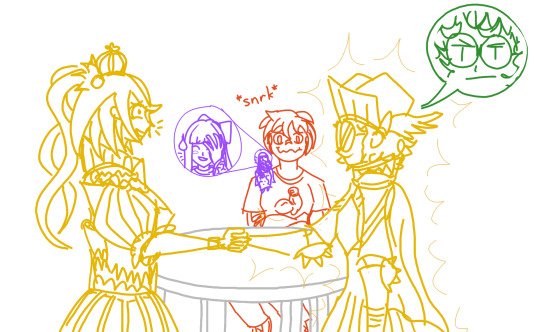
It goes super good.
So- after Hekima leaves, Sakura notices Tama-chan in a tree.

Sakura mentions how she wants to do good, and that one of the ways she’s planning on doing that is taking total control of the Hell Engine. Which, okay, out of context sounds like an incredibly supervillainous thing to say, but Tama-chan is in the loop.


Sakura mentions the power generated by her Hope burst, earlier, when she used it to prevent the Engine from falling apart on impact with the Earth. Tama-chan agrees that that’s unusual- and it’s one of the reasons that the Incubator guard on the Engine has been increased. Which, oh yeah, that’s a thing- in part because of the manifestation of an unknown energy source, and also because Piercing Perpendicular Edge Which Punishes Aggression got super fucked up by Seina’s witch event and they’re really suspicious, now. Tama-chan is under orders not to mess with the Engine any further, and there’s more things like Pierce patrolling the inside. Tama-chan refers to Pierce as “it”, and...


Tama-chan isn’t really interested in giving the incubators the time of day- but she seems to know a lot about what happened to Pierce. She asks Sakura if she knows the details, and Sakura describes them as “infected with empathy”, and suggests maybe trying to do that to the entire Incubator species, to make them not evil anymore.

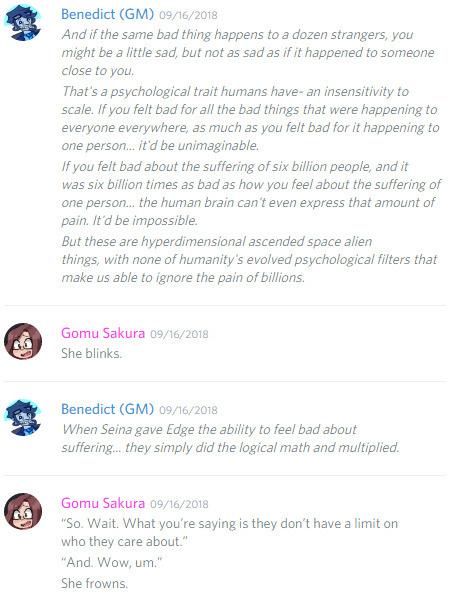
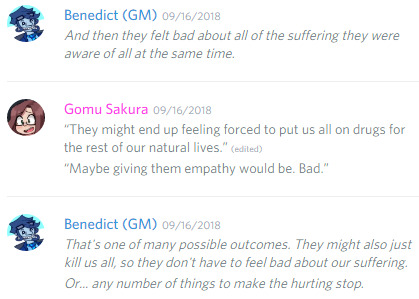
So... other plans, then. Rather than try and make the incubators cooperative, it’s going to come down to going behind their backs and doing some sneaky Engine hacking.
The big issue with that... is, well. They fought Pierce earlier, when he was papers in Seina’s barrier, and... what did he have? 81 Fury? Incubators have completely ridonkulous stats, and that includes Real- which means they’re going to auto-crit any sort of roll to notice someone stealthing. That means however they sneak in, it’s going to need a 0% chance of failure- or at least, low enough that the Incubators don’t even get a roll to notice.
They do some brainstorming re:stealth, but it keeps coming down to the issue of muffling stealth. Ibara’s Friction domain is probably applicable, but might not be up to the task. If only someone had power over sound...!
...Well, anyway, following some discussion there, Tama-chan has to go, and Sakura is invited to curry by Yukari.


Sakura attempts to read between the lines, which leads to...


Which... is just her characteristically overdramatic way of saying that her decision to tell the cannibals about the Big Plan is extremely dangerous, and now it’s out of her hands. She’s basically fine, as far as Yukari is ever fine.

Oh yeah, that’s a thing! Trying to help Sokoko wasn’t super doable earlier, what with how that’d involve fighting way too many witches in a row, with breaks to fight an increasingly-powerful feral magical girl in between. But now? The power levels they have access to are up to the challenge.
Sakura also brings up the stealth issue- specifically the sound-muffling requirement.

The conversation swings back around to Sakura’s frustrations, and Yukari presses her on that some.

Yukari is... unable to give her the reassurance she wants. She’s spent her life being resigned to transience, trying not to form attachments, and can’t in good conscience offer to be Sakura’s lifeline. They argue about optimism vs pessimism and the power of friendship for a little bit, but it comes down to...

Yukari tries to encourage Sakura to go back to school after all this, make normal friends and have a dang childhood already. Sakura’s not initially enthused about it, but the prospect of using her crazy powers to become an urban legend and get a reputation is enticing. The mood lightens, and eventually...

This... gets fairly silly and somewhat involved, but suffice it to say that Yukari plays a memetically badass version of herself who’s a werewolf and has guns and destroys all her enemies, and Sakura freaks out one of the waitresses by making tabletop supplies out of her own body parts. They have a whale of a time- and we’ll pick up with them next session, which follows on the heels of this one. In the meantime, let’s go check in on Makoto!

Makoto goes up to Yoshe’s apartment, and is invited inside by her dad. She goes to see the cannibals, and finds... they haven’t revived Kimiko yet. In fact, they’re arguing over whether or not to do it.

Rather than try and speculate and take a side, Makoto suggests just... asking Tama-chan what would happen, since presumably she’d know. Emiko and Yoshe aren’t exactly sure, since Tama-chan is sort of their mortal enemy, but they figure it can’t hurt if Makoto asks.
So... she does! Leaves and goes and tracks Tama-chan down, finding her in a tree outside a curry place. Specifically, the curry place Sakura and Yukari are eating at, but they’re unawares and Makoto doesn’t know they’re in there. Tama-chan’s spying is totally secure.
When Makoto asks about Kimiko, Tama-chan isn’t really sure. With Honoka’s one trauma track gone, the question is how much influence the original personality would have- the bare bones of her personality, who she is when she has no trauma tracks and can’t feel bad. If that person is a strong personality, it might affect Kimiko- but if it’s weak, Kimiko will probably be unaffected.

Tama-chan has been kind of uneasy this whole conversation, and Makoto is able to pick up on it.

Makoto reassures her that they’re okay now- that they can leave their issues with each other in the past. She offers a hug, which is kind of A Lot what with Tama-chan’s emotional state and physical size, and... well, after that winds down, Tama-chan awkwardly excuses herself to get back to work. Makoto goes back to the cannibals, to tell them the news.


Still, they decide to trust Makoto and go revive Kimiko. Emiko leaves to go collect Fumi-chan from outside, and Makoto and Yoshe make some small talk, wherein Yoshe admits she doesn’t actually hate the moon.

So, they finish up that conversation, and now it’s time to revive the golden girl.

Turns out you can force an Incubator to do a revival, so Emiko holds out Fumi-chan for Makoto to do the job.

Kimiko revives, and... instantly, something happens. Something happens which Makoto makes her saving throw against.

Kimiko calms down a little bit, no longer reacting on impulse to an immediate threat. So, she’s not going to try and incapacitate Makoto now, right?

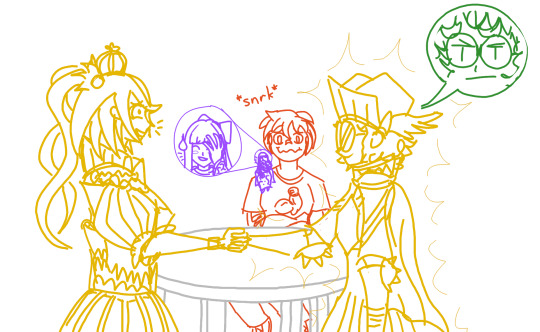

The other cannibals think this is hilarious, and Kimiko defends her decision by pointing out that Makoto can still talk, and the effect is temporary anyway, so it shouldn’t be a problem! Yoshe asks her to dispel it anyway, though.
So- they catch her up to speed on what happened since she was out. Kimiko wants to know if Emiko managed to take out any of the party after Kagutsuchi formed.


So- it’s sort of a catch-22. She’s not sure she can tell Kimiko, because Kimiko might try to sabotage the plan- but explaining to her why she shouldn’t try and sabotage the plan anyway would give away dangerous details. It’s all or nothing- once they have all the details, they’re either on-board or more dangerous than ever.

Makoto goes over the plan in vague terms- not saying anything specifically about what the Devil wants, or what the grief sink is, but telling them about the Devil’s offer and the grief sink’s existence.


Makoto points out that if this doesn’t work, they can still go back to Plan A. She just wants them to give the plan a chance, and hold off on killing people in the meantime.


Makoto tries to sell them on the use of making allies and artifacts- building and arming a coalition against the Incubators, instead of trying to concentrate power in one place. Emiko is totally sold on it- not least because being able to use artificing to enhance Seelenfaust means she can make it not suck.


Makoto points out that magic armor is a thing, that artifacts can be used to power people up without having to kill anyone.
(Oh, around that point, the gold wears off, and Yoshe talks Kimiko out of re-applying it.)

Makoto, lost for hard evidence, brings up that Yukari’s prophecies give the plan a good chance of success.

Kimiko is exercising the proper amount of paranoia here, which is to say: too much. Makoto points out that Hekima exists, can read minds, and verified Yukari’s trustworthiness- which just leads Kimiko to pass the buck. Now Yukari and Hekima might be in on the trick.
Still, Kimiko’s willing to let the relevant parties try to prove it to her firsthand- so Makoto is asked to set up a meeting. The cannibals, the devil, the party, and their allies- all in one place, trying to negotiate a truce.

Next time on No Driver’s License: the fate of the world is decided over curry.
6 notes
·
View notes
Photo

Since this week was Yakity-Sax was this week’s episode in America, I’ve decided to review something else today...

When we last left Ducktales, the fate of Della Duck was revealed. While the boys blamed Scrooge for building the Rocket Ship SHE STOLE, and saying he could have convinced her to turn back when DONALD FAILED TO DO SO, and saying he stopped when it was making a dent in his money (which to be fair they didn’t know he almost went bankrupt if it wasn’t for is investors). In case you couldn’t tell, I blame Della for her disappearance.

All this drove a rift between them, which has the boys living back with Donald while Scrooge is left all alone in his mansion. The Boys are so upset, they throw precious memories of their time with Scrooge into the ocean (with the exception of Louie who still saw financial gain with his artifact. Dewey threw it for him).

Meanwhile Scrooge looks like he’s ready to keel over as Magica (who is in complete control of Lena’s body) manages to convince him to let her in. She thinks this is all a trick but eventually discovers that yes, he is indeed this pathetic now thanks to losing his remaining family.

Trying to cheer up the boys, Donald decides that they’re moving to the one place they always wanted to go: Cape Suzette. Launchpad and Webby hearing this begins to worry and decide to come up with a plan to reunite the family. It helps that Huey and Louie begin to realize that Cape Suzette isn’t what they thought it was...

Sadly the Scrooge showing up as a surprise is ruined when Magica perfectly mimics Scrooge to say he is coming when in fact he hasn’t even heard of it. They also fear that Mrs. Beakly would ruin their plans to reunite the boys with their Uncle Scrooge.

To their surprise, she wants in. Being a former secret agent and a current Grandmother, she pretty much weaponized guilt to an almost lethal degree. Thanks to her, Donald and the boys begin to realize that they shouldn’t break up and are willing to forgive Scrooge once more.

Perfect timing too as Magica finally struck and took the #1 dime. So why was the dime so important this time? Turns out she was trapped in there and the only way for her to be free is to get the dime during the Lunar Eclipse. And now that she did, she doesn’t need Lena or Scrooge anymore.

I love this design. Green Feathers (which doesn’t last long), the cape that seems to act like wings during her first appearance. This is an awesome redesign. And the redesign doesn’t stop there as she is now the Shadow Queen, who can make others’ shadow do her bidding.

What’s worse is that the Shadow can use the Gizmoduck suit too, so they can’t rely on him to help. So its all down to Donald, the boys, Webby, Beakly, Launchpad and Gyro and his interns. Another thing to note that Gyro gives Donald a voice box to make him talk normal. Don’t expect this to continue after this episode.

With his new voice, he stages a plan that impresses Beakly herself. Team Gyro attack from the front, Launchpad crashes into the bin to cause a distraction, Donald and Beakly use the boat to come from behind and the kids stay out of the way (which was reverse psychology because he totally knows they’re gonna sneak into the bin).

When they went to recruit Lena to help, they discover that not only was she working with Magica, but she was also just a shadow. Webby surprisingly takes this well and has an outlet for her anger later in this episode. But without Lena, they manage to find a way into the bin anyway.

Those who made it to the bin are Donald and the kids. So Donald stood behind to fight off all the shadow warriors while they take care of Magica. Donald’s opponents consists of most of the villains previously, Beakly, and the Shadow Possessed Gizmoduck. The kids though handle Magica pretty well.

Huey’s inquisitive nature as well as his impressive dodging skills confuses Magica for a while. She was about to even explain her connection to the Lunar Eclipse before she realize that he shouldn’t know.

Louie using his money swimming skills as well as his con-artistry to create an opening for Webby. So what creative way does she handle Magica?

Straight up fighting her! This is how she releases her anger about finding out about Lena, who she blames all on Magica. For a girl with no magical powers, she does do amazingly well against Magica. Dewey tried, but didn’t do as hot.

But Friendship is Literal Magic as Lena comes back (briefly) to save her best friend. But Dewey did manage to get a lucky break and used Magica’s own magic to free Scrooge from the Dime.

With Scrooge back to normal in both personality and body, he makes Magica look easy. He disarms her wand and without her magical gem, she loses her powers (and her green feathers). She leaves with a smoke bomb attempt that works just as well as when Trixie used it.

When its all said and done, the family is reunited and Lena is within Webby’s shadow (they don’t know that). And all ends happily. But then you hear a familiar jingle...
youtube
That’s right, Della Duck is still alive and on the moon! So the hype for Season 2 continues.
Overall, Ducktales continues to show how reboots should be done. As much as I defend the new PPG, it really pales in comparison to what Disney did here.
6 notes
·
View notes
Text
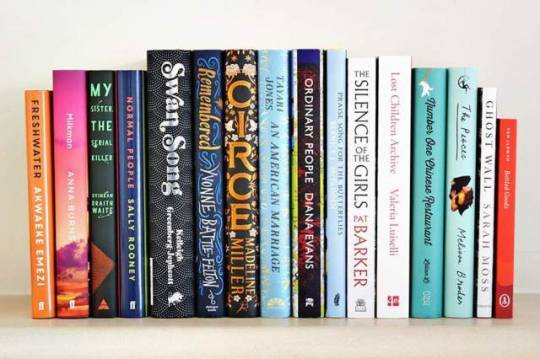
Credit: Evening Standard
The longlist for the 2019 Women’s Prize for Fiction was announced today. This year’s longlist contains books that are from both new and well-established authors that span from a range of genres, including seven debut novels.
The prize is also making history. For the first time in the prize’s 27 year history, the committee has nominated a non-binary trans author. Akwaeke Emezi is nominated for their first novel, Freshwater and is up for the £30,000 prize. Professor Kate Williams, one of the judges made a comment to the The Guardian about this historic moment:
It is a historic moment…We’re very careful not to Google the authors while judging, so we did not know. But the book found great favour among us, it is wonderful. They are an incredibly talented author and we’re keen to celebrate them.”
The shortlist for the prize will be announced on April 29 and the winner on June 5. Meet the sixteen books that made the cut:

Freshwater by Akwaeke Emezi
An extraordinary debut novel, Freshwater explores the surreal experience of having a fractured self. It centers around a young Nigerian woman, Ada, who develops separate selves within her as a result of being born “with one foot on the other side.” Unsettling, heartwrenching, dark, and powerful, Freshwater is a sharp evocation of a rare way of experiencing the world, one that illuminates how we all construct our identities.
Ada begins her life in the south of Nigeria as a troubled baby and a source of deep concern to her family. Her parents, Saul and Saachi, successfully prayed her into existence, but as she grows into a volatile and splintered child, it becomes clear that something went terribly awry. When Ada comes of age and moves to America for college, the group of selves within her grows in power and agency. A traumatic assault leads to a crystallization of her alternate selves: Asụghara and Saint Vincent. As Ada fades into the background of her own mind and these selves–now protective, now hedonistic–move into control, Ada’s life spirals in a dark and dangerous direction.

Milkman by Anna Burns
I read this two months ago and I highly enjoyed it. If you would like to read my review of it, you can find it here.
In this unnamed city, to be interesting is dangerous. Middle sister, our protagonist, is busy attempting to keep her mother from discovering her maybe-boyfriend and to keep everyone in the dark about her encounter with Milkman. But when first brother-in-law sniffs out her struggle, and rumours start to swell, middle sister becomes ‘interesting’. The last thing she ever wanted to be. To be interesting is to be noticed and to be noticed is dangerous.

My Sister, the Serial Killer by Oyinkan Braithwaite
When Korede’s dinner is interrupted one night by a distress call from her sister, Ayoola, she knows what’s expected of her: bleach, rubber gloves, nerves of steel and a strong stomach. This’ll be the third boyfriend Ayoola’s dispatched in “self-defence” and the third mess that her lethal little sibling has left Korede to clear away. She should probably go to the police for the good of the menfolk of Nigeria, but she loves her sister and, as they say, family always comes first. Until, that is, Ayoola starts dating a doctor at the hospital where Korede works as a nurse. Korede’s long been in love with him, and isn’t prepared to see him wind up with a knife in his back: but to save one would mean sacrificing the other…
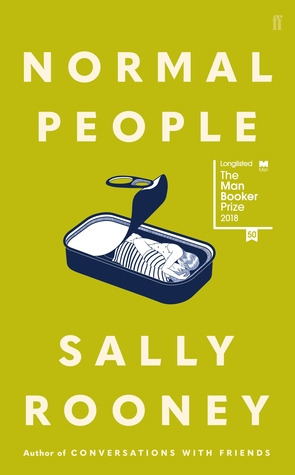
Normal People by Sally Rooney
Also Longlisted for the 2018 Man Booker Prize and nominee of the 2018 Costa Book Award
Connell and Marianne both grow up in the same town in rural Ireland. The similarities end there; they are from very different worlds. But they both get places to study at university in Dublin, and a connection that has grown between them despite the social tangle of school lasts long into the following years.
Sally Rooney’s second novel is a deeply political novel, just as it’s also a novel about love. It’s about how difficult it is to speak to what you feel and how difficult it is to change. It’s wry and seductive; perceptive and bold. It will make you cry and you will know yourself through it.
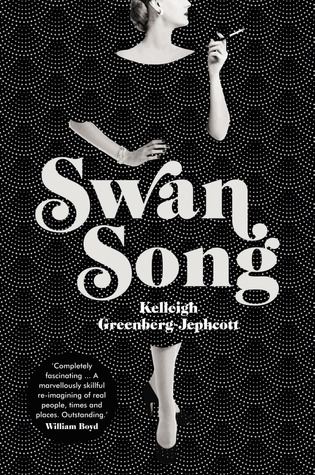
Swan Song by Kelleigh Greenberg-Jephcott
They told him everything.
He told everyone else.
Over countless martini-soaked Manhattan lunches, they shared their deepest secrets and greatest fears. On exclusive yachts sailing the Mediterranean, on private jets streaming towards Jamaica, on Yucatán beaches in secluded bays, they gossiped about sex, power, money, love and fame. They never imagined he would betray them so absolutely.
In the autumn of 1975, after two decades of intimate friendships, Truman Capote detonated a literary grenade, forever rupturing the elite circle he’d worked so hard to infiltrate. Why did he do it, knowing what he stood to lose? Was it to punish them? To make them pay for their manners, money and celebrated names? Or did he simply refuse to believe that they could ever stop loving him? Whatever the motive, one thing remains indisputable: nine years after achieving wild success with In Cold Blood, Capote committed an act of professional and social suicide with his most lethal of weapons . . . Words.

Ghost Wall by Sarah Moss
In the north of England, far from the intrusions of cities but not far from civilization, Silvie and her family are living as if they are ancient Britons, surviving by the tools and knowledge of the Iron Age.
For two weeks, the length of her father’s vacation, they join an anthropology course set to reenact life in simpler times. They are surrounded by forests of birch and rowan; they make stew from foraged roots and hunted rabbit. The students are fulfilling their coursework; Silvie’s father is fulfilling his lifelong obsession. He has raised her on stories of early man, taken her to witness rare artifacts, recounted time and again their rituals and beliefs—particularly their sacrifices to the bog. Mixing with the students, Silvie begins to see, hear, and imagine another kind of life, one that might include going to university, traveling beyond England, choosing her own clothes and food, speaking her mind.
The ancient Britons built ghost walls to ward off enemy invaders, rude barricades of stakes topped with ancestral skulls. When the group builds one of their own, they find a spiritual connection to the past. What comes next but human sacrifice?
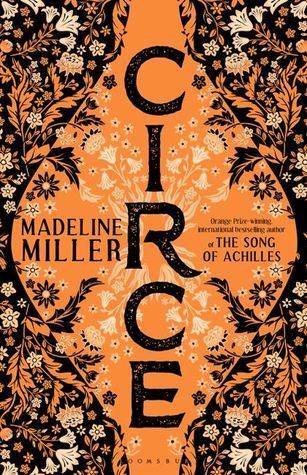
Circe by Madeline Miller
In the house of Helios, god of the sun and mightiest of the Titans, a daughter is born. But Circe has neither the look nor the voice of divinity, and is scorned and rejected by her kin. Increasingly isolated, she turns to mortals for companionship, leading her to discover a power forbidden to the gods: witchcraft.
When love drives Circe to cast a dark spell, wrathful Zeus banishes her to the remote island of Aiaia. There she learns to harness her occult craft, drawing strength from nature. But she will not always be alone; many are destined to pass through Circe’s place of exile, entwining their fates with hers. The messenger god, Hermes. The craftsman, Daedalus. A ship bearing a golden fleece. And wily Odysseus, on his epic voyage home.
There is danger for a solitary woman in this world, and Circe’s independence draws the wrath of men and gods alike. To protect what she holds dear, Circe must decide whether she belongs with the deities she is born from, or the mortals she has come to love.
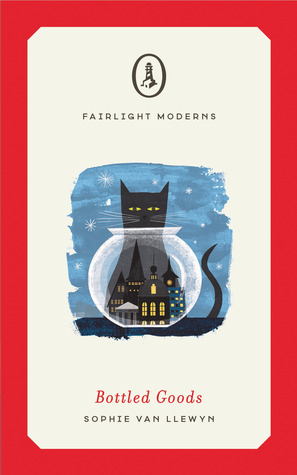
Bottled Goods by Sophie van Llewyn
When Alina’s brother-in-law defects to the West, she and her husband become persons of interest to the secret services, causing both of their careers to come grinding to a halt.
As the strain takes its toll on their marriage, Alina turns to her aunt for help – the wife of a communist leader and a secret practitioner of the old folk ways.
Set in 1970s communist Romania, this novella-in-flash draws upon magic realism to weave a tale of everyday troubles, that can’t be put down.
An American Marriage by Tayari Jones
Newlyweds Celestial and Roy are the embodiment of both the American Dream and the New South. He is a young executive, and she is an artist on the brink of an exciting career. But as they settle into the routine of their life together, they are ripped apart by circumstances neither could have imagined. In this deft exploration of love, loyalty, race, justice, and both Black masculinity and Black womanhood in 21st century America, Jones achieves that most-elusive of all literary goals: the Great American Novel.
Lost Children Archive by Valeria Luiselli
Told through the voices of the mother and her son, as well as through a stunning tapestry of collected texts and images–including prior stories of migration and displacement–Lost Children Archive is a story of how we document our experiences, and how we remember the things that matter to us the most. Blending the personal and the political with astonishing empathy, it is a powerful, wholly original work of fiction: exquisite, provocative, and deeply moving.
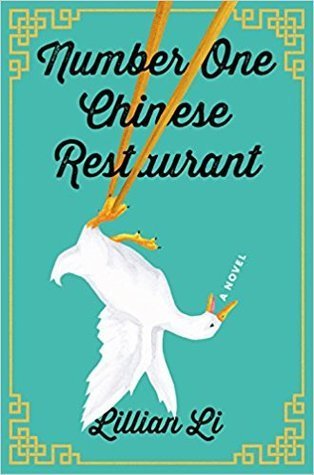
Number One Chinese Restaurant by Lillian Li
The Beijing Duck House in Rockville, Maryland, is not only a beloved go-to setting for hunger pangs and celebrations; it is its own world, inhabited by waiters and kitchen staff who have been fighting, loving, and aging within its walls for decades. When disaster strikes, this working family’s controlled chaos is set loose, forcing each character to confront the conflicts that fast-paced restaurant life has kept at bay.
Owner Jimmy Han hopes to leave his late father’s homespun establishment for a fancier one. Jimmy’s older brother, Johnny, and Johnny’s daughter, Annie, ache to return to a time before a father’s absence and a teenager’s silence pushed them apart. Nan and Ah-Jack, longtime Duck House employees, are tempted to turn their thirty-year friendship into something else, even as Nan’s son, Pat, struggles to stay out of trouble. And when Pat and Annie, caught in a mix of youthful lust and boredom, find themselves in a dangerous game that implicates them in the Duck House tragedy, their families must decide how much they are willing to sacrifice to help their children.

Ordinary People by Diana Evans
‘You can take a leap, do something off the wall, something reckless. It’s your last chance, and most people miss it.’ South London, 2008. Two couples find themselves at a moment of reckoning, on the brink of acceptance or revolution. Melissa has a new baby and doesn’t want to let it change her but, in the crooked walls of a narrow Victorian terrace, she begins to disappear. Michael, growing daily more accustomed to his commute, still loves Melissa but can’t quite get close enough to her to stay faithful. Meanwhile out in the suburbs, Stephanie is happy with Damian and their three children, but the death of Damian’s father has thrown him into crisis – or is it something, or someone, else? Are they all just in the wrong place? Are any of them prepared to take the leap?
Set against the backdrop of Barack Obama’s historic election victory, Ordinary People is an intimate, immersive study of identity and parenthood, sex and grief, friendship and aging, and the fragile architecture of love. With its distinctive prose and irresistible soundtrack, it is the story of our lives, and those moments that threaten to unravel us.

Praise Song for the Butterflies by Bernice L. McFadden
Abeo Kata lives a comfortable, happy life in West Africa as the privileged nine-year-old daughter of a government employee and stay-at-home mother. But when the Katas’ idyllic lifestyle takes a turn for the worse, Abeo’s father, following his mother’s advice, places her in a religious shrine, hoping that the sacrifice of his daughter will serve as religious atonement for the crimes of his ancestors. Unspeakable acts befall Abeo for the fifteen years she is enslaved within the shrine. When she is finally rescued, broken and battered, she must struggle to overcome her past, endure the revelation of family secrets, and learn to trust and love again.
In the tradition of Chris Cleave’s Little Bee, Praise Song for the Butterflies is a contemporary story that offers an educational, eye-opening account of the practice of ritual servitude in West Africa. Spanning decades and two continents, Praise Song for the Butterflies will break and heal your heart.
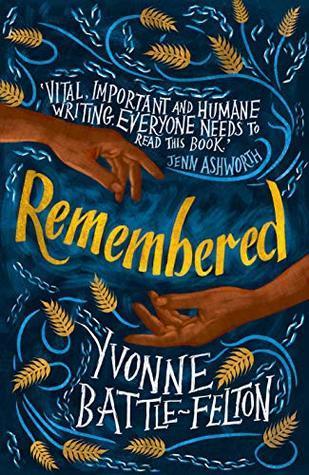
Remembered by Yvonne Battle-Felton
It is 1910 and Philadelphia is burning. For Spring, there is nothing worse than sitting up half the night with her dead sister and her dying son, reliving a past she would rather not remember in order to prepare for a future she cannot face. Edward, Spring’s son, lies in a hospital bed. He has been charged with committing a crime on the streets of Philadelphia. But is he guilty? The evidence — a black man driving a streetcar into a store window – could lead to his death. Surrounded by ghosts and the wounded, Spring, an emancipated slave, is forced to rewrite her story in order to face the prospect of a future without her child. With the help of her dead sister, newspaper clippings and reconstructed memories, she shatters the silences that have governed her life in order to lead Edward home.

The Pisces by Melissa Broder
Lucy has been writing her dissertation about Sappho for thirteen years when she and Jamie break up. After she hits rock bottom in Phoenix, her Los Angeles-based sister insists Lucy housesit for the summer—her only tasks caring for a beloved diabetic dog and trying to learn to care for herself. Annika’s home is a gorgeous glass cube atop Venice Beach, but Lucy can find no peace from her misery and anxiety—not in her love addiction group therapy meetings, not in frequent Tinder meetups, not in Dominic the foxhound’s easy affection, not in ruminating on the ancient Greeks. Yet everything changes when Lucy becomes entranced by an eerily attractive swimmer one night while sitting alone on the beach rocks.
Whip-smart, neurotically funny, sexy, and above all, fearless, The Pisces is built on a premise both sirenic and incredibly real—what happens when you think love will save you but are afraid it might also kill you.
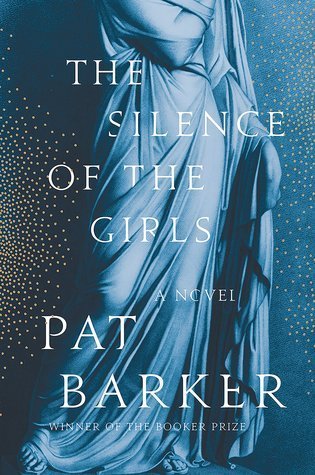
The Silence of the Girls by Pat Barker
The ancient city of Troy has withstood a decade under siege of the powerful Greek army, which continues to wage bloody war over a stolen woman—Helen. In the Greek camp, another woman—Briseis���watches and waits for the war’s outcome. She was queen of one of Troy’s neighboring kingdoms, until Achilles, Greece’s greatest warrior, sacked her city and murdered her husband and brothers. Briseis becomes Achilles’s concubine, a prize of battle, and must adjust quickly in order to survive a radically different life, as one of the many conquered women who serve the Greek army.
When Agamemnon, the brutal political leader of the Greek forces, demands Briseis for himself, she finds herself caught between the two most powerful of the Greeks. Achilles refuses to fight in protest, and the Greeks begin to lose ground to their Trojan opponents. Keenly observant and coolly unflinching about the daily horrors of war, Briseis finds herself in an unprecedented position, able to observe the two men driving the Greek army in what will become their final confrontation, deciding the fate not only of Briseis’s people but also of the ancient world at large.
Briseis is just one among thousands of women living behind the scenes in this war—the slaves and prostitutes, the nurses, the women who lay out the dead—all of them erased by history. With breathtaking historical detail and luminous prose, Pat Barker brings the teeming world of the Greek camp to vivid life. She offers nuanced, complex portraits of characters and stories familiar from mythology, which, seen from Briseis’s perspective, are rife with newfound revelations. Barker’s latest builds on her decades-long study of war and its impact on individual lives—and it is nothing short of magnificent.
Longlist for 2019 Women’s Prize for Fiction Announced The longlist for the 2019 Women's Prize for Fiction was announced today. This year's longlist contains books that are from both new and well-established authors that span from a range of genres, including seven debut novels.
#Anna Burns#Book Lists#Book Prizes#Books#Female Writers#LGBT#Literary Awards#Literary Fiction#Literary Prizes#Milkman#Normal People#Sally Rooney#Tayrai Jones#Women#Women&039;s Prize for Fiction#Women&039;s Prize for Fiction 2019#WomensPrize
0 notes